
22 Books from 2022
“A peasant that reads is a prince in waiting.” (Walter Mosley)
This year’s reading list is – as usual – a wide-ranging series of topics that will fill your mind with big ideas and new ways of looking at the world. If you need even more recommendations, look at my previous lists (21 books from 2021, 20 Books from 2020, 19 Books from 2019, 18 Books from 2018) or, browse through the online Athenaeum for a wealth of other ideas.
As always, a recommendation of any book on this website is not a complete endorsement. I try to alert readers to objectionable content, but always recommend discernment. In general, ‘Reader Discretion’ means that there is content that some readers may dislike or find objectionable; ‘Parental Discretion’ means that there is content that is age-restricted – probably not a good book for a child. However, this is just a general guideline, so don’t rely too heavily on it.
Click the picture of the book to visit its page on Amazon. I use the following grading system:
5 Stars: A book that is profound, paradigm-shaping, or exceptional in some way. Very few books ever receive five stars from me.
4.5 Stars: An excellent book that I would like to give five stars to – but I can’t quite describe it as ‘brilliant,’ ‘profound,’ or ‘life-changing.’ Still, I would highly recommend it to anyone!
4 Stars: A great book, worth reading, and significantly better than the average book.
3 Stars: An average book. If you are interested in the subject, you will find it useful.
2 Stars: Below average. It may have some good points, but probably not worth your time. Some people may find these books worth skimming.
1 Star: I find no reason to read this book, or even skim it. In fact, it isn’t even worth finishing.
(1) Dominion and Dynasty: A Theology of the Hebrew Bible (Stephen Dempster) 5 Stars
Packed with insights about the Old Testament, this book has become an essential reference any time that I venture into a study of the Hebrew Bible. This book goes through each book of the Old Testament, following the order of the Bible as it was in the time of Jesus. My own copy is bright yellow, because I highlighted so many insightful thoughts and useful observations from the text.
(2) Till We Have Faces: A Myth Retold (C. S. Lewis) 5 Stars
Although I was initially skeptical, Lewis’ retelling of an ancient Greek myth – the myth of Cupid and Psyche – is an enthralling read that presents a deep knowledge of human nature. On the surface, it functions in the realm of Greek mythology, including Greek deities. Underneath, it reveals the human condition and provides invaluable concepts for Christians to ponder deeply.
(3) The Rise and Fall of Mars Hill Podcast (Christianity Today) 5 Stars
New forms of media – such as podcasts – are gradually entering the domain that books once held – useful repositories of information. The Rise and Fall of Mars Hill is the first time that I’ve placed a podcast on my ‘reading list.’ In all fairness, there are so many things that I don’t like about this podcast. I don’t appreciate the perspective on certain theological topics. Christianity Today – the maker of this podcast – should have called out the problems of Mark Driscoll long before they did. I could go on. Still, despite all its negatives, this podcast is undoubtedly a five-star production. It’s an in-depth look at dynamics of power, authority, pride, and control, specifically in a religious context. This podcast should be required listening for all seminary students, and possibly all others in church leadership positions as well. Listener discretion advised due to thematic content.
(4) Notes from the Tilt-A-Whirl: Wide-Eyed Wonder in God’s Spoken World (N.D. Wilson) 5 Stars
Here is a book that will provide a whimsical, yet deeply true, perspective on life. Likening our lives to riding a carnival ride (a big spinning ball), this book explores themes of life and death, joy and sorrow, mortality and eternity. The book itself is a work of art – beautiful word pictures, hilarious illustrations, and a writing style that is a joy to read. Once I started this book, I could barely put it down – and when I did, I left with a deep-seated sense of wonder at the world that God created. Parental discretion advised.
(5) TED Talks: The Official TED Guide to Public Speaking (Chris Anderson) 4.5 Stars
This book is an easy read, readily skimmable, and filled with simple, practical suggestions on how to be a great public speaker. I love the idea of the book itself – it brings the classical subject of ‘rhetoric’ into the 21st century. This means that it touches on all aspects of public speaking: the speaking itself, how to be a good speaker, how to use props and visual aids, etc.
(6) God’s Kingdom through God’s Covenants: A Concise Biblical Theology (Gentry and Wellum) 4.5 Stars
It has been said that the key differences between all Christian denominations stem from the way that they define and relate the old and new covenants. This book – an abridgement of Kingdom through Covenant, is a biblical theology that presents the storyline of the Bible. Arguing that the ‘spine’ of the story is a succession of covenants, this book is invaluable for helping think through these covenants and understanding their relationship with each other. Although the first chapter is quite dense, the following chapters are not so challenging and provide many fascinating insights into Scripture.
(7) A Theology of Biblical Counseling: The Doctrinal Foundations of Counseling Ministry (Heath Lambert) 4.5 Stars
Too often, theology is treated as merely an academic subject without much real-world application. This book changes that, showing how different aspects of theology apply practically to biblical counseling. Not only was this helpful as I study counseling – but I was challenged and encouraged in my own reading.
(8-10) The Pacific War Trilogy (Ian Toll) 4.5 Stars
The Pacific Crucible: War at Sea in the Pacific, 1941-1942
The Conquering Tide: War in the Pacific Islands, 1942-1944
Twilight of the Gods: War in the Western Pacific, 1944-1945
Ian Toll’s Pacific War Trilogy is a masterpiece of historical writing. Detailed yet interesting, minute yet expansive, these books – collectively more than 2000 pages – show the pacific war in all its vastness. Besides the excellent writing and intensive research, the narrative held my attention because it details the story of a war fought across the most remote, expansive ocean on earth. The war is filled with stories of dramatic events and sudden twists: Pearl Harbor, Midway, Iwo Jima, Hiroshima, and so much more. Reader discretion. advised.
(11) Empire of the Summer Moon: Quanah Parker and the Rise and Fall of the Comanches, The Most Powerful Indian Tribe in American History (S. C. Gwynne) 4.5 Stars
A mere one hundred and fifty years ago, western civilization was limited by a vast expanse of empty prairie known as ‘Comancheria.’ This was the homeland of the Comanches, a native tribe that resisted western expansion in Texas. Empire of the Summer Moon details the fascinating, brutal, and dramatic decline of this native region. The story comes to life through the real-life story of Quanah Parker, a powerful chief whose white mother was abducted from a Texas settlement as a young girl. Parental discretion advised due to thematic content.
(12) The Christian Counselor’s Manual: The Practice of Nouthetic Counseling (Jay Adams) 4.5 Stars
Jay Adam’s classic book on counseling is a fine balance between theory and practice. Although somewhat outdated, it still contains much that is beneficial, and it is by no means irrelevant. Adams talks about the goal of counseling, how to structure counseling sessions, motivations, effecting change, gathering data, questions, and much else.
(13) William Carey (S. Pearce Carey) 4.5 Stars
William Carey launched the modern missions movement, and this book is probably the best biography on him. From his humble roots as a lowly English cobbler, to his rise as one of the most respected linguists in India, this book gives an intimate, behind-the-scenes view of the man, his many trials, and his remarkable faith.
(14) Dominion: How the Christian Revolution Remade the World (Tom Holland) 4.5 Stars
We only notice incomplete revolutions. And Christianity, as this book argues, was a completed revolution. It was a revolution in thinking, and it isn’t an exaggeration to say that it changed everything – from politics to morality, even down to how we keep track of time or speak of personhood. We don’t realize this, only because the revolution was so complete that nothing from the previous culture was left unchanged. In fact, this book goes further, arguing that even post-Christian thinking stems from a Christian foundation, and is impossible to understand apart from it. The book accomplishes its purpose by telling the stories of key figures at key moments in history, thus keeping the narrative interesting and concrete rather than dull and conceptual.
(15) The Body: A Guide for Occupants (Bill Bryson) 4.5 Stars
For this year’s science book, I chose a book on the human body – and I wasn’t disappointed. Even though I know a fair amount of anatomy and physiology, I was still amazed by the scale, complexity, and engineering that are present in every human. This is far from a bland survey of biology. It’s filled with little known facts, recent research, and lots of interesting anecdotes. Parental Discretion.
(16) The Rise and Progress of Religion in the Soul: Illustrated in a Course of Serious and Practical Addresses Suited to Persons of Every Character and Circumstance: With a Devout Meditation or Prayer Subjoined to Each Chapter (Philip Doddridge) 4.5 Stars
Rise and Progress is a famous book, responsible for encouraging and directing many in their walk with God. I’m disappointed that it is rarely known today. Functioning like a guide for souls, each chapter addresses an individual in a specific situation. It begins with the unconverted, covering such topics as The careless sinner awakened and The sinner sentenced. Then there is advice for the seeker, such as An address to a soul so overwhelmed with a sense of the greatness of its sins, that it dares not apply itself to Christ with any hope of salvation. Next comes advice for Christians in various situations, finally ending with a chapter to The Christian honoring God by his dying behavior. Although the language is archaic, it is well worth the read.
(17) Counseling the Hard Cases: True Stories Illustrating the Sufficiency of God’s Resources in Scripture (Scott and Lambert) 4 Stars
One of the frequent criticisms leveled against biblical counseling is the damage that some people say it causes. Admittedly, in the hands of an unwise or unskilled counselor, ‘biblical counseling’ is often nothing more than trite and unhelpful statements like ‘trust the Lord’ or ‘just stop sinning.’ But real biblical counseling – wise, mature discipleship of individuals, using the Bible to answer the deep questions and problems of life – is profoundly beneficial. This book gives a number of case studies to show the powerful results of biblical counseling in the most challenging situations imaginable.
(18) The Text of the Old Testament: An Introduction to the Biblia Hebraica (Wurthwein and Fischer) 4 Stars
The Biblia Hebraica is the text of the Old Testament, and this book explains the history of the text and the manuscripts that exist. This is a broad-ranging survey, covering much minute ground, such as textual criticism, ancient translations of the Hebrew Bible, the Dead Sea Scrolls, and more. For those who are interested, it is an important survey. This book shows that textual criticism and textual transmission are certainly not simple subjects – but the text has been remarkably well-preserved.
(19) Don’t Waste Your Life (John Piper) 4 Stars
Piper’s direct challenge to Christians is something that we all need to hear more often. It’s a counter-cultural message in a society where personal fulfillment and pleasure count more than suffering for the sake of gospel proclamation. This book is challenging because it is so convicting – and that is why we need to read it.
(20) Lays of Ancient Rome (Thomas Babington Macauley) 4 Stars
Without stacks of textbooks and high rates of literacy, the ancient world transmitted its stories through epic poems – just think of Homer’s Iliad. This book is a (relatively) modern attempt to convey the spirit of ancient Roman epic poems. It consists of four epic poems, written in delightful English verse. It was a pleasure to read one of these around a campfire with some friends!
(21) Progressive Covenantalism: Charting a Course between Dispensational and Covenantal Theologies (Wellum and Parker) 4 Stars
This book, building on the foundation laid in Kingdom Through Covenant, answers a number of questions that arise in the study of biblical theology. As the title indicates, the authors of these essays are presenting a theological system that is midway between dispensationalism and covenantalism. This book covers such varied topics as the Mosaic Law, the relationship between Israel and the church, the Sabbath, and the land promises to Israel.
(22) A Sacrifice of Praise: An Anthology of Christian Poetry in English from Caedmon to the Mid-Twentieth Century (James Trott) 4 Stars
Here is a collection of Christian poetry, from the earliest times to the present. Due to the length of this book, I focused this year on early Christian poetry – up to the year 1700. This is the best book that I know to cover such a broad range of poetry, from a variety of denominations. Of course, the quality of the poems differ, but there is enough for anyone to find something that they enjoy in this anthology.









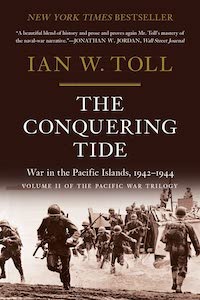


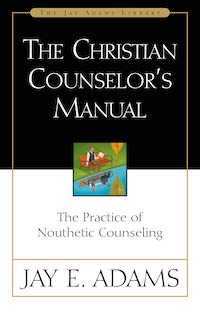
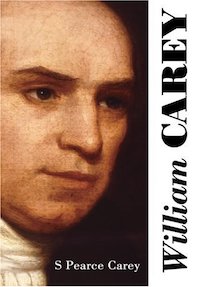
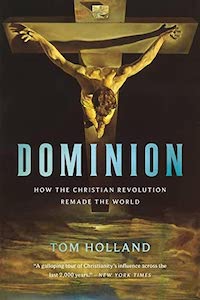
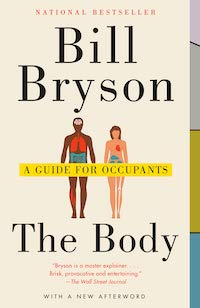

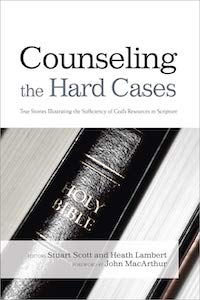
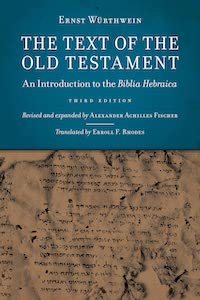
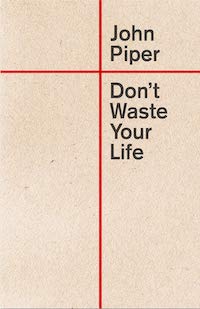
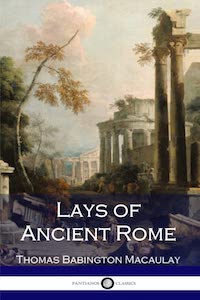
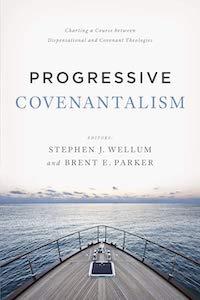
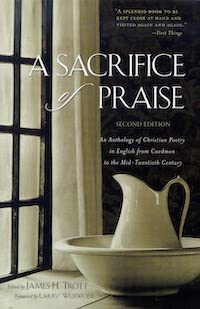



Great list! Thanks for putting this out; you gave me a lot of ideas (for whenever I have more time to read). 🙂
Always enjoy reading this, thank you!